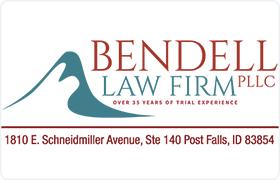Calder Misdemeanor Lawyer, Idaho
Sponsored Law Firm
-
 x
x

Click For More Info:
-
The Bendell Law Firm, PLLC
1810 E Schneidmiller Ave, Suite 140, Post Falls, ID 83854» view mapCriminal Defense, Accident & Injury Law You Don’t Pay If We Don’t Win
With deep experience and a multi-faceted perspective and understanding of Idaho and Washington law, we can help you achieve the best results in a variety of practice areas.
208-981-0555
Not enough matches for Calder Misdemeanor lawyer.
Below are all Calder Criminal lawyers.
James Bendell
✓ VERIFIED *Status is reviewed annually. For latest information visit hereAccident & Injury, Personal Injury, Criminal, DUI-DWI
Former Prosecutor, Superior Court Commissioner and Judge Pro Team
Bendell Law Firm’s attorney James Bendell focuses primarily on personal injury, civil litigation, and criminal defense, and is also extensive experi... (more)
John H. George
Child Support, Criminal, Constitutional Law, Administrative Law
Status: In Good Standing *Status is reviewed annually. For latest information visit here
FREE CONSULTATION
CONTACTDan Jay Rude
Criminal, Divorce & Family Law, Lawsuit & Dispute, Traffic
Status: In Good Standing *Status is reviewed annually. For latest information visit here Licensed: 46 Years
Casey Becker Riedner
General Practice
Status: In Good Standing *Status is reviewed annually. For latest information visit here Licensed: 13 Years
Michael Lee Rude
Misdemeanor, DUI-DWI, Criminal
Status: In Good Standing *Status is reviewed annually. For latest information visit here Licensed: 8 Years
Monica Gayle Rector
Health Care, Misdemeanor
Status: In Good Standing *Status is reviewed annually. For latest information visit here Licensed: 8 Years
Adrien Lindsay Fox
Government, Criminal
Status: In Good Standing *Status is reviewed annually. For latest information visit here Licensed: 11 Years
Alexandria T. Lewis
Car Accident, DUI-DWI, Adoption, Employment Discrimination
Status: In Good Standing *Status is reviewed annually. For latest information visit here
Andrea Shannon Hunter
Government, Criminal, Credit & Debt, Bankruptcy & Debt
Status: In Good Standing *Status is reviewed annually. For latest information visit here
Anna S. Vowels
Lawsuit & Dispute, State Government, Criminal, Civil Rights
Status: In Good Standing *Status is reviewed annually. For latest information visit here Licensed: 23 Years
 James Bendell Post Falls, ID
James Bendell Post Falls, ID Practice AreasExpertise
Practice AreasExpertise
